牛津上海版六年级上册U4教案
沪教牛津版六年级英语上册教案Module4Unit45篇
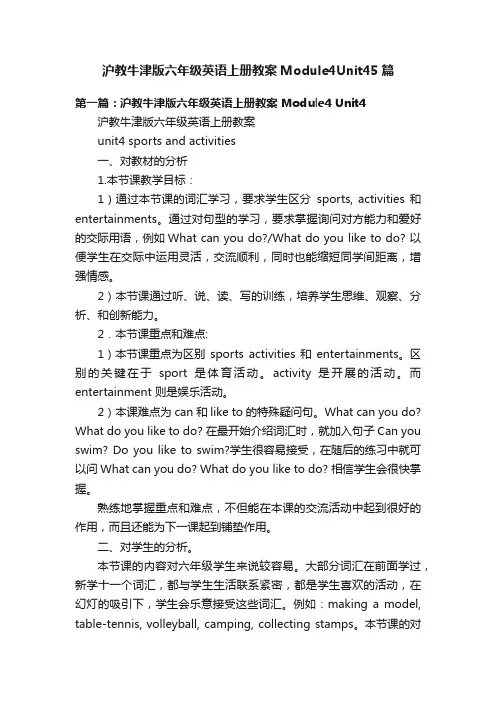
沪教牛津版六年级英语上册教案Module4Unit45篇第一篇:沪教牛津版六年级英语上册教案 Module4 Unit4 沪教牛津版六年级英语上册教案unit4 sports and activities一、对教材的分析1.本节课教学目标:1)通过本节课的词汇学习,要求学生区分sports, activities 和entertainments。
通过对句型的学习,要求掌握询问对方能力和爱好的交际用语,例如What can you do?/What do you like to do? 以便学生在交际中运用灵活,交流顺利,同时也能缩短同学间距离,增强情感。
2)本节课通过听、说、读、写的训练,培养学生思维、观察、分析、和创新能力。
2.本节课重点和难点:1)本节课重点为区别sports activities和entertainments。
区别的关键在于sport是体育活动。
activity是开展的活动。
而entertainment 则是娱乐活动。
2)本课难点为can 和like to的特殊疑问句。
What can you do? What do you like to do? 在最开始介绍词汇时,就加入句子Can you swim? Do you like to swim?学生很容易接受,在随后的练习中就可以问What can you do? What do you like to do? 相信学生会很快掌握。
熟练地掌握重点和难点,不但能在本课的交流活动中起到很好的作用,而且还能为下一课起到铺垫作用。
二、对学生的分析。
本节课的内容对六年级学生来说较容易。
大部分词汇在前面学过,新学十一个词汇,都与学生生活联系紧密,都是学生喜欢的活动,在幻灯的吸引下,学生会乐意接受这些词汇。
例如:making a model, table-tennis, volleyball, camping, collecting stamps。
沪教牛津版六年级英语上册教案 Module4 Unit2.
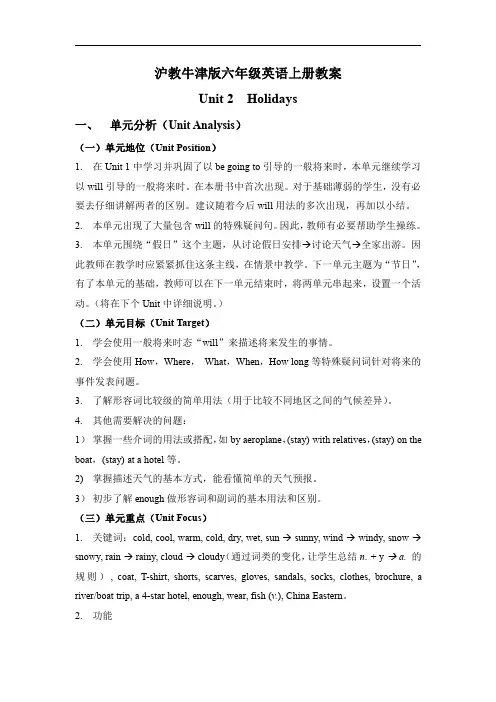
沪教牛津版六年级英语上册教案Unit2Holidays一、单元分析(Unit Analysis)(一)单元地位(Unit Position)1.在Unit1中学习并巩固了以be going to引导的一般将来时,本单元继续学习以will引导的一般将来时。
在本册书中首次出现。
对于基础薄弱的学生,没有必要去仔细讲解两者的区别。
建议随着今后will用法的多次出现,再加以小结。
2.本单元出现了大量包含will的特殊疑问句。
因此,教师有必要帮助学生操练。
3.本单元围绕“假日”这个主题,从讨论假日安排→讨论天气→全家出游。
因此教师在教学时应紧紧抓住这条主线,在情景中教学。
下一单元主题为“节日”,有了本单元的基础,教师可以在下一单元结束时,将两单元串起来,设置一个活动。
(将在下个Unit中详细说明。
)(二)单元目标(Unit Target)1.学会使用一般将来时态“will”来描述将来发生的事情。
2.学会使用How,Where,What,When,How long等特殊疑问词针对将来的事件发表问题。
3.了解形容词比较级的简单用法(用于比较不同地区之间的气候差异)。
4.其他需要解决的问题:1)掌握一些介词的用法或搭配,如by aeroplane,(stay)with relatives,(stay)on the boat,(stay)at a hotel等。
2)掌握描述天气的基本方式,能看懂简单的天气预报。
3)初步了解enough做形容词和副词的基本用法和区别。
(三)单元重点(Unit Focus)1.关键词:cold,cool,warm,cold,dry,wet,sun→sunny,wind→windy,snow→snowy,rain→rainy,cloud→cloudy(通过词类的变化,让学生总结n.+y→a.的规则),coat,T-shirt,shorts,scarves,gloves,sandals,socks,clothes,brochure,a river/boat trip,a4-star hotel,enough,wear,fish(v.),China Eastern。
六年级英语上册Unit4《Ourneighbours》(第2课时)教案牛津上海版(深圳用)
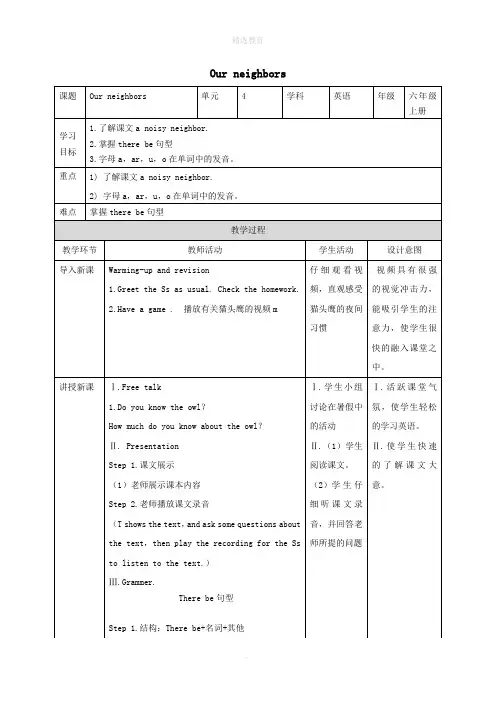
Our neighborsb.Ask and answer(1)Where did the rabbits and the owl live?(2)Why were the rabbits tired and angry?(3)Was the owl a good neighbour?Why or why not?(4)Where do many rabbits sleep today?d.根据课文,完成下题。
There_____(be)an owl and three rabbis in the forest.The owl______(live)in the tree.The rabbis______(居住)on the ground.The owl was very______(吵闹的).He ______(make)a lot of______(噪音).The rabbits was______(生气的).They_________________(有一个注意).They_____(dig)a hole ,then they can sleep well.e.Write about a neighbor.Tom is my neighbor.He is twenty years old.He is a worker. 学生根据课文内容完成本题学生根据课文内容完成本题学生根据课文内容来描述自己的邻居。
的掌握情况课文与语法相结合,达到课文与语法同步学习的目的。
课文与语法相结合,达到课文与语法同步学习的目的。
检测学生对自己的邻居的了解程度。
I often play ball games with him.I sometimes play football with him.Last Sunday,we played basketball together. Ⅳ.PronounceStep1(1)展示每个单词的读音,并附上录音。
牛津上海版一起六年级上册unit 4《what would you like to be》优秀教案(重点资料).doc
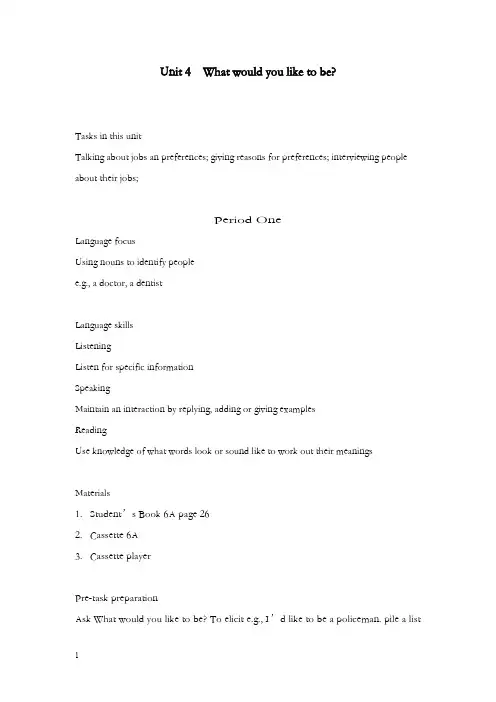
Unit 4 What would you like to be?Tasks in this unitTalking about jobs an preferences; giving reasons for preferences; interviewing people about their jobs;Period OneLanguage focusUsing nouns to identify peoplee.g., a doctor, a dentistLanguage skillsListeningListen for specific informationSpeakingMaintain an interaction by replying, adding or giving examplesReadingUse knowledge of what words look or sound like to work out their meaningsMaterials1.Student’s Book 6A page 262.Cassette 6A3.Cassette playerPre-task preparationAsk What would you like to be? To elicit e.g., I’d like to be a policeman. pile a listof jobs on the board as the students reply. Then go through the list asking individual students e.g., Would you like to be a policeman? To elicit Yes, I’d like to be a policeman. No, I’d like to be a teacher.While-task procedure1.Play the cassette for Look and Learn. The students listen and repeat.2.Give the students time to look at the picture in the Look, Listen and number.3.Play the cassette for Look, listen and number. The students listen and write thecorrect numbers in the boxes.4.Play the cassette again. The students listen, repeat and check the answers.5.Ask a few other individual students What would you like to be? To elicit e.g., I’d like to be a pilot.HomeworkWorkbook 6a page 21Period TwoLanguage focusUsing modal verbs to express preferencese.g., Would you like to be a policeman?Asking wh-questions to find out the reasone.g., Why/why not?Using connectives to give reasons.e.g., I’d like to be policeman because I want to make out city a city place.Language skillsListeningListen for specific informationSpeakingMaintain an interaction by replying, asking questions, explaining and using formulaic expressions where appropriate.ReadingRead for specific informationMaterials1.Student’s Book 6A page 272.Workbook 6A pages 21, 22, 24 and 263.Cassette 6A4.Cassette playerPre-task preparationPlay a miming game. Ask the students to look at the jobs on student’s Book page 26 and choose one of the jobs. Ask for volunteers to e out and mime a job. The students guess e.g., Would you like to be a doctor? The student who guesses correctly takes the next turn to mime a job.While-task procedure1. Give the students time to look at Read and think. The students write the jobs in the table and tick the ones they would like to do.2. Ask questions about the table e.g., this person teaches children English. What is his/her job? To elicit He/She is an English teacher.3. Workbook 6A page 21a. Read the sentences. The students match them with the pictures.b. Ask questions e.g., Look at picture one. What does this person do?4. Give the students time to read Play a game. Play the cassette. The students listen. Playthe cassette again. The students repeat.5. In pairs, students practice the dialogues. Select pairs to read a dialogue.6. Ask individual students questions e.g., Would you like to be a doctor? To elicit Yes, I would. No, I wouldn’t.7. Write the beginning of the two sentences on the board I would like to be a doctor because…Ask the students to plete the sentences. Replace ”doctor”with other jobs and repeat the procedure.8. The students practice in groups, taking turns to ask a member of the group Would you like to be a /an…?9. Workbook 6A page 24a. Give the students time to look ar the pictures.b. play the cassette. The students listen and match.Post-task activitiesWorkbook 6A page 26a In groups, students discuss different jobs and why they would or would not like to do them. They then write their own lists.b Ask a few individual students What job would /wouldn’t you like to do? Why?c. The students write the sentences. Ask individual students to read one of their sentences.ConsolidationWorkbook 6A page 22Period ThreeLanguage focusUsing wh-questions to find out specific informatione.g., What’s your job?Using connectives to give reasons.e.g., Because I like to make sick people better.Using prepositions to indicate timee.g., I usually start work at half past eight in the morning.Language skillsListeningIdentify details that support a main ideaSpeakingOpen an interaction by greeting someone in an appropriate mannerMaintain an interaction by replying, asking questions, explaining an using formulaic expressions where appropriateReadingRecognize the presentation of ideas through headingsWritingGather and share information by using strategies such as interviewingMaterials1.Student’s Book 6A page 282.Workbook 6A pages 23, 25 and 273.Photocopiable pages 2 and 34.Cassette 6A5.Cassette playerPre-task preparationAsk the students about their daily routines e.g., When do you get up? When do you go to school? What is your favourite lesson? Why? What do you do after school? When do you go to bed?While-task procedure1 Give the students time to look at the picture in Look and Read.2 Play the cassette. The students follow in their books..3 In pairs, students practise the dialogue. Select pairs to read a section of the dialogue.4 Ask questions about the dialogue e.g., How old is Samuel Han? What’s his job? Does he like his job? Why? When does he usually start/ finish work?5 The students plete Read an write. Ask one or two students to read their pleted reports.6.Workbook 6A page 25a.In pairs, students practice the dialogue. Select pairs to read a section of the dialogue.b.The students plete the card at the bottom of page 25.c.Ask questions about the information on the carde.g., What’s the man’s name?7. Read the instructions in Find out. You may want to use photocopiable pages 2 and 3 here.Post-task activitiesWorkbook 6A page 27 (for more able students)The students can either interview an adult or plete the cards as followsa.In groups, students select a job and write notes about it, using their imagination.b.The students each interview another member of the group an plete the card.c.Select individual students to talk about the carde.g., Miss Zhu is a bank clerk. She is twenty years old. She likes here job because shemeets a lot of people. She starts work ar nine o’clock in the morning. She finishes work at five o’clock in the afternoond. The students write about the person they have interviewed or imagined using the notes they have made.e. Ask one or two students to read what they have written about the person to the class. ConsolidationWorkbook 6A pages 23Period FourLanguage focusUsing wh-questions to find out specific informatione.g., What would you like to be?Using modal verbs to express wishes.e.g., I would like to be a pilot.Language skillsListeningListen for specific informationSpeakingMaintain an interaction by replying, asking questions, explaining and using formulaic expressions where appropriateReadingRecognize formats and language features in narrative and non-narrative texts WritingDevelop written texts by presenting main and supporting ideasMaterials1.Student’s Book 6A page 292.Drawing paper3.Cassette 6A4.Cassette playerPre-task preparationAsk individual students What would you like to be? To elicit e.g., I would like to be a policeman. Ask Why? To elicit Because I want to make our city a safe place.While-task procedure1 Give the students time to look at the pictures.2 Play the cassette of the poem. The students listen. Play the cassette again. The students repeat.3 Select individual students to read a verse of the poem.4 Read About you. Distribute drawing paper. The students write their peoms e.g., What would you like to be?What would you like to be?I would like to be a dentist.That’s what I would like to be.The students then draw a picture of the job.5 Ask a few individual students to read their poems. Display some of the poems.ConsolidationCopy the new wordsRecite the passage.。
牛津上海版英语六年级上册Module2Unit4课时教学设计
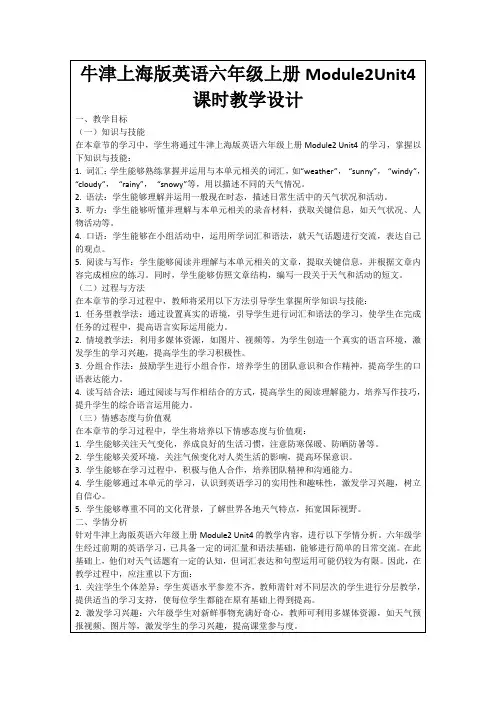
4.口语表达:学生需要在小组讨论中表达自己的观点,但可能存在表达不流畅、词汇量不足等问题。
设想:设计口语交流任务,鼓励学生提前准备,并在课堂上提供词汇和句型的支持。
(二)教学设想
1.采用多元化教学手段:结合多媒体资源,如视频、歌曲、图片等,多角度呈现天气情况,增强学生的学习体验。
3.教学内容:
(1)词汇:介绍本节课的天气词汇,如“sunny”, “windy”, “cloudy”, “rainy”, “snowy”等,并通过例句展示词汇的用法。
(2)语法:讲解一般现在时态,引导学生用该时态描述日常活动和天气状况。
(三)学生小组讨论
1.教学活动:学生分成小组,讨论各自的天气喜好和经历。
3.分组合作法:鼓励学生进行小组合作,培养学生的团队意识和合作精神,提高学生的口语表达能力。
4.读写结合法:通过阅读与写作相结合的方式,提高学生的阅读理解能力,培养写作技巧,提升学生的综合语言运用能力。
(三)情感态度与价值观
在本章节的学习过程中,学生将培养以下情感态度与价值观:
1.学生能够关注天气变化,养成良好的生活习惯,注意防寒保暖、防晒防暑等。
针对牛津上海版英语六年级上册Module2 Unit4的教学内容,进行以下学情分析。六年级学生经过前期的英语学习,已具备一定的词汇量和语法基础,能够进行简单的日常交流。在此基础上,他们对天气话题有一定的认知,但词汇表达和句型运用可能仍较为有限。因此,在教学过程中,应注重以下方面:
1.关注学生个体差异:学生英语水平参差不齐,教师需针对不同层次的学生进行分层教学,提供适当的学习支持,使每位学生都能在原有基础上得到提高。
(沪教牛津版)六年级英语上册教案Module2Unit4(2)
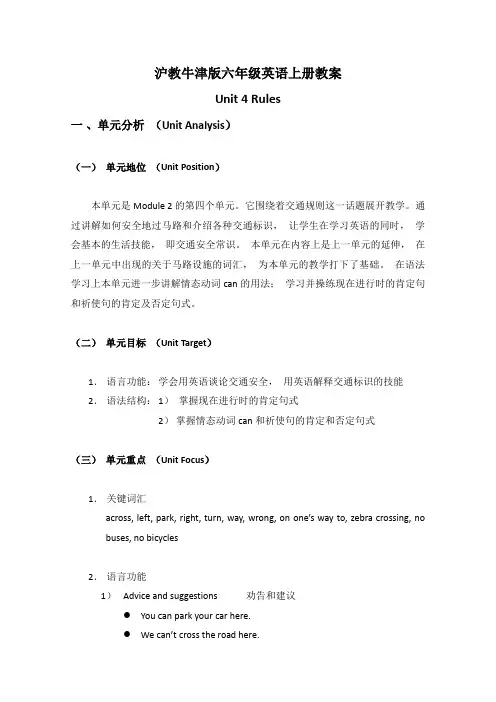
沪教牛津版六年级英语上册教案Unit 4 Rules一、单元分析(Unit Analysis)(一)单元地位(Unit Position)本单元是Module 2的第四个单元。
它围绕着交通规则这一话题展开教学。
通过讲解如何安全地过马路和介绍各种交通标识,让学生在学习英语的同时,学会基本的生活技能,即交通安全常识。
本单元在内容上是上一单元的延伸,在上一单元中出现的关于马路设施的词汇,为本单元的教学打下了基础。
在语法学习上本单元进一步讲解情态动词can的用法;学习并操练现在进行时的肯定句和祈使句的肯定及否定句式。
(二)单元目标(Unit Target)1.语言功能:学会用英语谈论交通安全,用英语解释交通标识的技能2.语法结构: 1)掌握现在进行时的肯定句式2)掌握情态动词can和祈使句的肯定和否定句式(三)单元重点(Unit Focus)1.关键词汇across, left, park, right, turn, way, wrong, on one’s way to, zebra crossing, no buses, no bicycles2.语言功能1)Advice and suggestions 劝告和建议●You can park your car here.●We can’t cross the road here.2)Instruction 指示●Look left! Look right! Look left again!●Cross the road.●Walk quickly!3)Warning 警告●Don’t cross!●Don’t turn right!●Don’t run!●No buses!4)Description 描述●The girl is waiting on the pavement.●The boy is walking across the zebra crossing quickly.3.语法要点1)现在进行时的肯定句:The girl is waiting on the pavement.The boy is walking across the zebra crossing quickly.2)情态动词can的肯定和否定句:You can park your car here.We ca n’t cross the road here.3)祈使句的肯定和否定句:Turn right!Don’t turn right!二、教学设计(Teaching Designs)语法结构任务1 操练现在进行时所需时间:约15 --- 20分钟所需资料:练习册第14页,学生自己的生活照片。
Unit4Writing教案牛津上海版(试用本)六年级英语上册
1.be able to know the structure of the poem ‘What would you like to be’
2.be able to write a passage about ‘What would you like to be’
Teaching procedures:
Stages
Learning Activities
Teaching purposes
Leadin
OK, guys.What would you like to be? Why?
To lead in the topic.
Prewriting
Today we will talk about what would you like to be. Look at the picture. What would Peter and Kitty would like to be? Excellent. Now please read the poem and answer the questions. So, who writes the poem? Good. Inunit 2, we have learned a poem. Let’s review. We call each part in the poem ‘verse’. How many verses are there in this poem? Yes. How about in this poem? Very good. Each line in the poem is called line. Then, this poem is a rhythming poem. You can see a lot of rhythming words. But, isthis poem a rhythming poem? No!
沪教牛津版六年级英语上册教案Module3 Unit4
沪教牛津版六年级英语上册教案Module3 Unit4教学目标1.学习掌握与地点有关的单词和短语:the park, the cinema, the supermarket, the museum, go straight, turn left/right, and so on.2.学会运用“Excuse me, where is the…?”以及方向词汇进行地点问询和指路。
3.培养学生运用英语进行实际交流的能力,提高听说读写能力。
教学重难点1.教学重点:掌握与地点有关的单词和短语,并能够通过问询和指路进行实际交流。
2.教学难点:能够提问和回答地点相关的问题,并运用所学知识进行实际指路。
教学准备1.教学课件或黑板白板2.单词卡片或图片卡片3.学生练习册或作业本教学过程Step 1 导入新课1.Greetings and warm-up:–Greet the students and check their attendance.–Review the vocabulary from the previous unit related to directions and locations.–Ask students to share their favorite places in the city.Step 2 新课讲解1.Present the new vocabulary:–Show pictures or flashcards of different places such as park, cinema, supermarket, museum, etc.–Introduce the vocabulary using the target language:。
新沪教牛津版六上Module 4教案
Module 4The natural world一、核心词汇1.名词:air 空气factory 工厂smoke 烟wood 木头;木材match 火柴Earth 地球part 地区;区域forest 森林land 陆地ocean 海洋rubbish 垃圾balloon气球glass玻璃制品;玻璃2.动词:plant 种植cool 使变凉miss 想念hurt 感到痛recycle 回收利用;再利用3.形容词:alive 活着的dirty 脏的fresh 清新的sick 生病的clean 干净的;洁净的own自己的4.其他:everywhere 处处;到处5.核心短语:keep…alive让……活着plant trees 植树have to不得不cut…down 把……砍倒look for 寻找so many这么多pickup捡起;拾起shopping bag 购物袋plastic bag 塑料袋二、了解词汇1.其他why 为什么2.一些短语look at 看一看be from 来自……cool the air 使空气变凉make a poster 制作一张海报live on the Earth 住在地球上in the tree 在树上三、核心句型1.It keeps them high in the sky.它让他们在高高的天空中。
解读: 此句型是表达使某人/某物保持一种状态的句型, 这个句型是一个一般现在时的陈述句, 主语是第三人称单数it, 所以谓语动词keep 要用其第三人称单数形式keeps。
keep是“维持, 保持”的意思, 后面接人称代词时要用其宾格形式。
举一反三: He would keep in touch with us wherever he was.他无论在什么地方,他总是与我们保持联系。
Will you keep us the seats? 你给我们保留些座位, 好吗?It keeps me sticking into my heart. 它使我的心不能忘却!2.We get wood from trees. 我们从树上获得木头。
新沪教牛津版六上Unit 4教案
Module 2 RelationshipsUnit 4 Our neighboursTeaching Aims(教学目标):1.能听、说、读、写本课的核心词汇:neighbour, son, daughter, noisy, dig2.能熟练掌握核心句型:Did you play with Sam last weekend?- Yes, I did.3.询问别人邻居的情况及邻里关系,体会邻里关系的重要性。
Teaching Importances and Difficulties (教学重难点):1.能在语境中正确运用本单元的核心词汇。
2.能用Do you…? 和Did you…? 询问别人和邻居的相处情况。
3.在句型Did you…?中动词用原型。
4.了解字母a, u, o及字母组合ar在单词中的发音规律,拼读简单的单词。
Teaching Tools(教学用具):录音机、自制课件、照片等Teaching Procedures(教学过程):StepⅠ. Warm up and revision(热身与复习)1. Greetings.2. Play a game: quick eyesStepⅡ. Presentation and practice (自主探究)1. 生词关T: Please write the meanings on your paperneighbour ______ son ______ daughter________writer________ weekend______ play chess_________The Greens__________ The Wus_________2. T:Show the pictures, learn the new words: neighbour / daughterSs:read these words after teacher.3. Work in groups to read the new words. Recite the new words, then recite in groups。
- 1、下载文档前请自行甄别文档内容的完整性,平台不提供额外的编辑、内容补充、找答案等附加服务。
- 2、"仅部分预览"的文档,不可在线预览部分如存在完整性等问题,可反馈申请退款(可完整预览的文档不适用该条件!)。
- 3、如文档侵犯您的权益,请联系客服反馈,我们会尽快为您处理(人工客服工作时间:9:00-18:30)。
a useful book;注意另外两个特殊词: a one-leg table ; a European
②常见辅音字母不发音的单词有:an honest boy;an hour;an honor;
8.if=whether 是否
从下情况只用whether
.从句有or not 用whether...or not...
②后面里不定式to......whether to...
③放在介词后……介词+whether-.....
④宾语从句放句首,表强调:whether--.....
9.find out 查明(根据线索)
学科教师辅导教案
讲义编号: 组长审核:
学员编号: 年级:六年级 课时数:
学员姓名: 辅导科目:英语 学科教师:
授课主题
U4
教学目的
1.掌握单词
2.掌握课堂知识点
3.掌握语法冠词
教学重点
冠词
授课日期及时段
教学内容
1.检查上节课作业
2.复习上节课知识点
单词讲解:
1.secretary n.秘书 secret n.秘密
Cook v.做饭 n,厨师 cooker n厨具
because 因为十句子
because of 因为+短语/单词
I don’t go out because it is raining heavily.
I don’t go out because of the heavy rain.
let sb do = make sb do 让某人做……
start sth / doing sth
begin sth / doing sth
开始某事/做某事
finish sth / doing sth
完成某fternoon--p.m
语法:
一、基本用法
用法
例句
(1)泛指某一类人或事物中的一个或一类。
make our city a safe place.=keep our city safe.让我们城市是个安全的地方
safe adj.安全的 n.保险箱
safety n.安全
safety rules 安全规则
Save v.拯救
safely adv. 安全地
find out 查明(根据线索/调查)
find找到(结果)
(4)用于某些固定词组前。
have a good time,in a hurry,have a rest,for a while,take a walk,have a cold
二、a / an的区别
a用在辅音音素开头的单数可数名词或字母前,an用在元音音素开头的单数可数名词或字母前。如a book , an orange , an egg
2.police woman --police women policeman --policemen
German --Germans fireman=firefighter fisherman 渔夫
3.dentist 牙医 doctor 医生 nurse 护士 Vet兽医
4.person --persons
③单独字母前的用an记忆口诀:Mr. Li has one fox .
如:There is an “ f” and an “o” in the word “ frog ”
用法口诀:某人某物属某类,一人一物指全体;某人某物不具体,数量名词前表“每一”
基本用法
例句
(1)用来表示特指的或指双方都知道的人或事
find 找到(结果)
look for 寻找(过程)
10.finish=complete
Finish sth
finish doing sth
11.at the age of ... . = I’m ... years old 在.....岁
课文讲解:
what would you like to be ?=What do you want to be ?
be different from...与……不同=not the same as.....
job 可数名词
工作
work 不可教名词
good/well-better-best
make sick people better 让病人好转
He is a sick people.
He is ill.
cook sth for sb 为某人做饭
look for 寻找(过程)
I can't find my pen.
I'm looking for my pen.
问职业:
what's your job ? what's his job ?
what are you? what is he?
what do you do ? what does she do ?
An elephant is much heavier than a horse.
(2)在叙述时用于第一次提到的某人或某物之前。
Thereis a bookon the desk.
(3)用于序数词前,表示“又一,再一”。
I have read the books twice, but I want to read them a third time.
people --people
Personal adj.私人的
5.teach v.教 teacher n.教师 teach me English
6.put out 扑灭 put up 张贴 put off 延迟
7.Interview v.采访 interviewee n.被采访者 interviewer n.采访者
The man over there is John's uncle.
(2)表示上文中提到过的人或者事
There is an English book on the desk. The book is Li Lei's.
I would like to be a/an...==I want to be a/an ...
I wouldn't like to be a/an______=I don't want to be a/an.....
different adj. 不同的
Difference n.不同点(可数名词)
